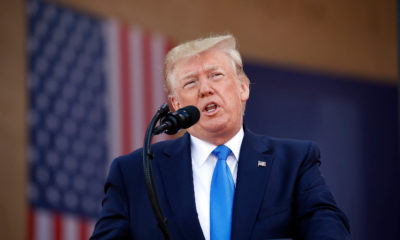World
More Republicans see Trump as their best bet: Poll

By Arun Kumar
Washington: As rival Republican presidential candidates looked for ways of combating a surging Donald Trump, a new poll suggested that party supporters increasingly think he was their best bet for the 2016 presidential race.
With confidence fading in traditional politicians like Jeb Bush and Wisconsin governor Scott Walker, 39 percent of Republican voters viewed Trump as their best shot at winning the presidency, according to a New York Times/CBS News poll. This compared with 26 percent who favoured him in a CBS survey in August. Only 15 percent said they would not back him as the party’s nominee.
Despite some reservations about Trump, the real estate mogul appears to be gaining acceptance as a possible nominee, suggested the poll released on the eve of second presidential debate Wednesday at the Ronald Reagan Presidential Library in Simi Valley, California.
Neurosurgeon Ben Carson, another outsider, has also risen to 23 percent from just 6 percent early last month. Trump draws 27 percent support in the new poll, compared with 24 percent in August.
Among Democrats, uneasiness with Hillary Clinton is growing and creating a possible opening for Vice President Joseph Biden, as he mulls a presidential run, the poll found. Her lead over self-proclaimed socialist Senator Bernie Sanders has shrunk from 41 percentage points to 20 points. Nearly six in 10 Democrats said they wanted to see Biden join the race.
Meanwhile, Trump kept up his tirade against illegal immigrants at a campaign event in Iowa saying, “We have many problems in our country. One of them is immigration.”
“There’s tremendous crime. There’s tremendous drugs pouring across the border … going to Chicago, going to New York, going to LA.”
“We get the drugs, they get the money. The drug cartels are going wild; they cannot believe how stupid our country is.”
“People just pour into the country. (Americans are) disgusted when a woman who’s nine months pregnant walks into the country and has a baby and you have to take care of that baby for the next 85 years.”
“They’re never going to do anything with these countries. It’s an instinct – they don’t have it. It’s just going to be more of the same.”
Taking on the Republican frontrunner on the immigration issue, Biden Tuesday accused Trump – naming him twice – as reverting to “xenophobia” in a play for votes.
“There’s one guy absolutely denigrating an entire group of people, appealing to the baser side of human nature, working on this notion of xenophobia in a way that hasn’t occurred in a long time,” he said at a reception marking Hispanic Heritage Month.
Biden also called Trump as the purveyor of a “sick message” about immigrants coming to the US. He said that political tack wouldn’t ultimately resonate with most of the country.
World
Lockdowns in China Force Urban Communities to Defy Censorship and Vent Frustration Online

Shanghai’s rich middle class is leading a wave of online dissent over the strict and prolonged lockdowns imposed in various parts of the country. Chinese internet censorship is struggling as patience is wearing thin in many urban centers, coming up with creative forms of online protests.
Social Media Posts Revealing Lockdown Tension in Shanghai
Drawn-out lockdowns are nothing new in China as authorities insist with the nation’s zero-Covid policy since the start of the pandemic. Currently over This time around, however, metropolitan areas like Shanghai are increasingly difficult to keep quiet, given that its more than 25 million residents have seen weeks of total isolation along with food shortages and many other service interruptions.
Dozens of towns and reportedly over 300 million Chinese citizens have been affected by lockdowns of different severity. As expected, urban netizens have been most outspoken over their difficulties by finding creative ways to get around state censorship and bans placed on topics, news comments and spontaneous campaigns.
Shanghai residents have been using mobile proxies and hijacking seemingly unrelated hashtags to talk about healthcare issues, delivery failures and the overall severity of their situation. The “positive energy” that the Chinese government wants to transmit during the recent prolonged series of lockdowns does not come naturally to those counting food supplies and online censors are working hard to filter words, trending topics and undesired social media sharing.
WeChat groups and message threads are under constant monitoring. Posts questioning the zero-Covid approach have been quickly deleted, including by leading Chinese health experts like Dr. Zhong Nanshan. Video footage is soon censored and protests and investigations are quickly made to disappear.
Where this has not worked, officials have exposed banners with warnings and outright threats like “watch your own mouth or face punishment”, while drones have been patrolling the city skies. Yet, if anything, this has led to further tensions and unspoken confrontation with Shanghai’s educated and affluent middle class.
Creative Online Solutions Harnessing Civic Energy
Announcements by Chinese social media that they would be publishing the IP addresses of users who “spread rumors” have not helped either. Tech industry research has shown that much of Asia’s tech-savvy population has a habit of using mobile proxies and other privacy tools, quickly finding workarounds to browse the internet freely and talk to the world about the hottest topics.
The sheer volume of forbidden posts is already a challenge for the very censorship system, experts explain. Unable to track all trending hashtags, state workers overlook topics that speak about the US, Ukraine or other popular news. Linking human rights elsewhere to their situation, Chinese online dissidents establish their informal channels and “hijack” the conversation to share personal or publicly relevant information about the Covid suppression in their town.
Sarcastic and satirical posts still dominate. Others hope to evade the censors by replacing words from famous poems or the national anthem. One thing is certain – social media, when harnessed with the right creativity, has proven its ability to mount pressure on the government in even some of the most strictly controlled tech environments like China.























